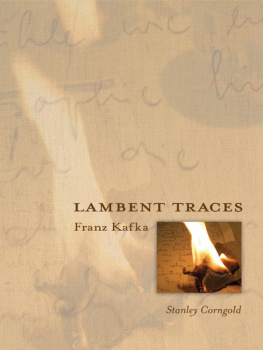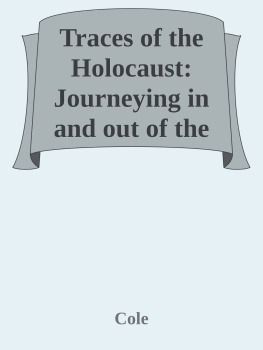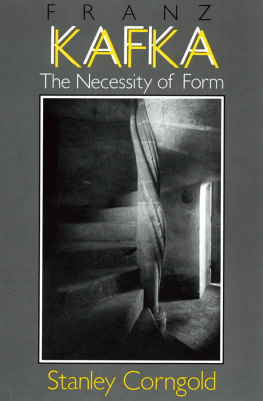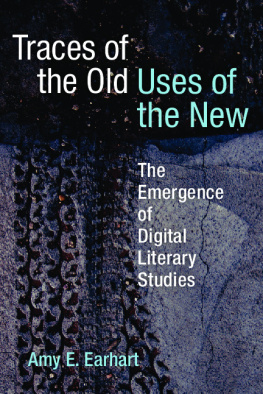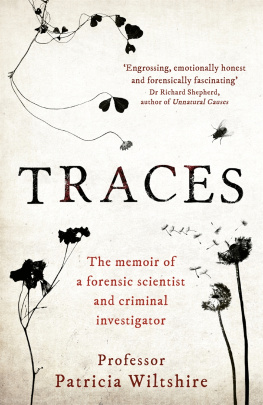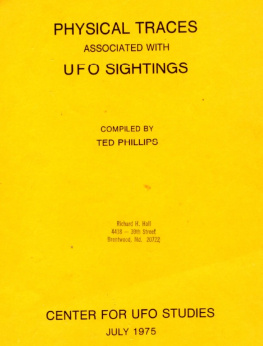Corngold - Lambent Traces
Here you can read online Corngold - Lambent Traces full text of the book (entire story) in english for free. Download pdf and epub, get meaning, cover and reviews about this ebook. year: 2008, publisher: Princeton University Press, genre: Romance novel. Description of the work, (preface) as well as reviews are available. Best literature library LitArk.com created for fans of good reading and offers a wide selection of genres:
Romance novel
Science fiction
Adventure
Detective
Science
History
Home and family
Prose
Art
Politics
Computer
Non-fiction
Religion
Business
Children
Humor
Choose a favorite category and find really read worthwhile books. Enjoy immersion in the world of imagination, feel the emotions of the characters or learn something new for yourself, make an fascinating discovery.
- Book:Lambent Traces
- Author:
- Publisher:Princeton University Press
- Genre:
- Year:2008
- Rating:3 / 5
- Favourites:Add to favourites
- Your mark:
- 60
- 1
- 2
- 3
- 4
- 5
Lambent Traces: summary, description and annotation
We offer to read an annotation, description, summary or preface (depends on what the author of the book "Lambent Traces" wrote himself). If you haven't found the necessary information about the book — write in the comments, we will try to find it.
Lambent Traces — read online for free the complete book (whole text) full work
Below is the text of the book, divided by pages. System saving the place of the last page read, allows you to conveniently read the book "Lambent Traces" online for free, without having to search again every time where you left off. Put a bookmark, and you can go to the page where you finished reading at any time.
Font size:
Interval:
Bookmark:
Lambent Traces
Franz Kafka
Lambent Traces
Franz Kafka
Stanley Corngold
PRINCETON UNIVERSITY PRESS
PRINCETON AND OXFORD
Copyright 2004 by Princeton University Press
Published by Princeton University Press, 41 William Street, Princeton, New Jersey 08540
In the United Kingdom: Princeton University Press, 3 Market Place, Woodstock,
Oxfordshire OX20 1SY
All Rights Reserved
Library of Congress Cataloging-in-Publication Data
Corngold, Stanley.
Lambent traces: Franz Kafka / Stanley Corngold.
p. cm.
Includes index.
Includes bibliographical references.
eISBN: 978-1-40082-613-1
1. Kafka, Franz, 1883-1924-Criticism and interpretation. I. Title.
PT2621.A26Z6645 2004 833''.912-dc22 2003057399
British Library Cataloging-in-Publication Data is available
This book has been composed in Sabon
Printed on acid-free paper.
www.pup.princeton.edu
Printed in the United States of America
1 3 5 7 9 10 8 6 4 2
For Walter Sokel
Das Frchtchen fllt nicht weit vom Stamm.
Slanting through the words there come vestiges of light.
Franz Kafka, Dearest Father
A mild and lambent light of Prophecy may be considered as encircling the Jews whole constitution.
Frederic Myers, Catholic Thoughts on the Bibleand Theology
For the incomprehensible and unforgettable thing was that this law glowed: it radiated, it scorched and destroyed.
Elias Canetti, The Conscience of Words
CONTENTS
I
PREFACE
FRANZ KAFKA WAS BORN on July 3, 1883, into a German-speaking Jewish family in Prague, the capital of the Czech Lands of the Austro-Hungarian Empire. This piling up of ethnic particulars right from the start should suggest something of the complexity of Kafkas predicament as it is reflected in his stories, novels, and confessional writings. Kafkas situation, like his citys, is mazy, intricate, and overly specified by history, lending his life an exceptional danger and promise: the danger of becoming lost in impenetrable contradiction that finally flattens out into anxiety, apathy, nothingness; and the promise, too, of a sudden breaking open under great tension into a blinding prospect of truth. At various times you see Kafka laying weight on one or the other of his identity elements in an effort to mark out his wayhe understood Yiddish, learned Hebrew, toyed with Zionism; he espoused socialist ideals that aligned him with the aspirations of the Czech-speaking working class; and he sought literary fame by competing with masters of German literature living and writing in the German-speaking capitals (chiefly Berlin, hardly at all Vienna, which he disliked).
The way is a figure of speech that is meant to confer a special distinction on Kafkas decision to write. The work that he actually produced and published in his lifetime is not huge by ordinary standards of literary greatness, consisting of seven small volumes, four of them devoted to single stories. Yet on the strength of The Judgment (Das Urteil), The Stoker (Der Heizer), and The Metamorphosis (DieVerwandlung), all of which he published early, in single volumes, in the years 1913-15, Kafka enjoyed an indubitable literary esteem. His stories were admired by writers of the order of Robert Musil and Rainer Maria Rilke, and publishers like Ernst Rowohlt and Kurt Wolff pressed him for more of his work. There stood in his way, however, for most of his life, the mass and difficulty of his professional duties: he was a high officialSenior Legal Secretaryat the partly state-run Workers Accident Insurance Institute.
Kafkas writing arose as an empirical practice, at a placea deskat a timebetween eleven at night and three in the morning. To accomplish what he did, he had to construct a kind of salient around this time and place: he required an almost unimaginably deep degree of protection for his writing. Yet for as long as he was employed by the office,he could not feel free of its demands. His best known story, The Metamorphosis, which recounts the transformation of a traveling salesman into a verminous beetle, suggests the omnipresence of just this office as a threat. Soon after Gregor Samsa wakes at four (read: just as Kafka wakes from his creative dream spent writing), the household is invaded by the office head, who knocks on his door, demanding Gregors loyalty and attention to his job. The imposition on the hero of a verminous body connects in Kafkas imagination with the monstrous reduction of himself at the instant his private redoubt is invaded. In this story the daily logic of cause and effect is reversed: here the monstrosity is the harbinger, and not the result, of the invasion. Kafka wrote that if he did not write, there would be nothing left of him; and if he were not let in peace, there would indeed be nothing left of him. At the end of The Metamorphosis, the charwoman says, Look, you dont have to worry about getting rid of the stuff next door. Its already been taken care of (M 42).
Kafka prepared for his profession from early on: he attended the German National Altstdter Gymnasium; took his law exams at the German Charles University; and, thereafter, on his own account a token Jew among Germans (and after 1918 a token German among Czechs), worked, and was advanced, for fourteen years in the office that released him only after his tuberculosis asserted the greater claim. With almost pathological modesty, he suppressed the knowledge of his achievement on behalf of workmens compensation (his activity is not to be confused with that of little clerks like the young Italo Svevo or Fernando Pessoa). Time and again, he was obliged to bring home masses of documents to prepare for court defenses of the Institutes cases. That the writing of The Metamorphosis was, to Kafkas mind, ruined by the business trip he had to take while in the throes of composition is well known. Less well known is the fact that this business trip was a complex legal defense that he won, obtaining a solid settlement for the Institute (LF 69).
There is, however, another, and altogether productive, sense in which the world of the office enters his stories, shaping the spaces, for example, in which the hero of The Trial encounters the officials of the court that has arrested him for an unnamed crime. The attics and personnel of lower-middle-class tenements also contribute to the scenethe rough world that Kafka knew through his erotically charged city walks and the clamor of the beneficiaries of the insurance he helped to disburse. Kafkas literary greatness as an analyst of modernity, of the fusion of bureaucracy and technology as the governing principles of everyday life, would not have been achieved were it not for his immersion in the phantasmagoric hell of office life. And still this burden drained him and threatened to leave nothing over for what finally mattered to him: literature. It is only from literature and never, to Kafkas mind, the benevolent aspect of his professional work that he could imagine his justification.
Kafka lived his secretly excruciating bachelors life within a radius of a few miles from the Old Town Center of Prague, held captive until 1923, the year before his death, by the city he called this old crone with claws (L 5). During this time he made trips, often with friends, fairly far afieldto Paris and London and Como and Berlin, and in the last year of his life did indeed live in Berlin. But what he felt with almost unbearable intensityleading him, especially at the time of his writing his first important stories and just before beginning The Castle, to fear that he was going madwere the elements of his personality in tension. At best this tension worked to produce a sort of claustral space between himself and the din of the world that did not exclude the entrance of subliminally selected productive atoms. He was responsive to politics and history and public culture, but he sought to translate this polemical complex, for his safety, into a private, recondite, even dreamlike text, whose purest expression is his writing.
Next pageFont size:
Interval:
Bookmark:
Similar books «Lambent Traces»
Look at similar books to Lambent Traces. We have selected literature similar in name and meaning in the hope of providing readers with more options to find new, interesting, not yet read works.
Discussion, reviews of the book Lambent Traces and just readers' own opinions. Leave your comments, write what you think about the work, its meaning or the main characters. Specify what exactly you liked and what you didn't like, and why you think so.

